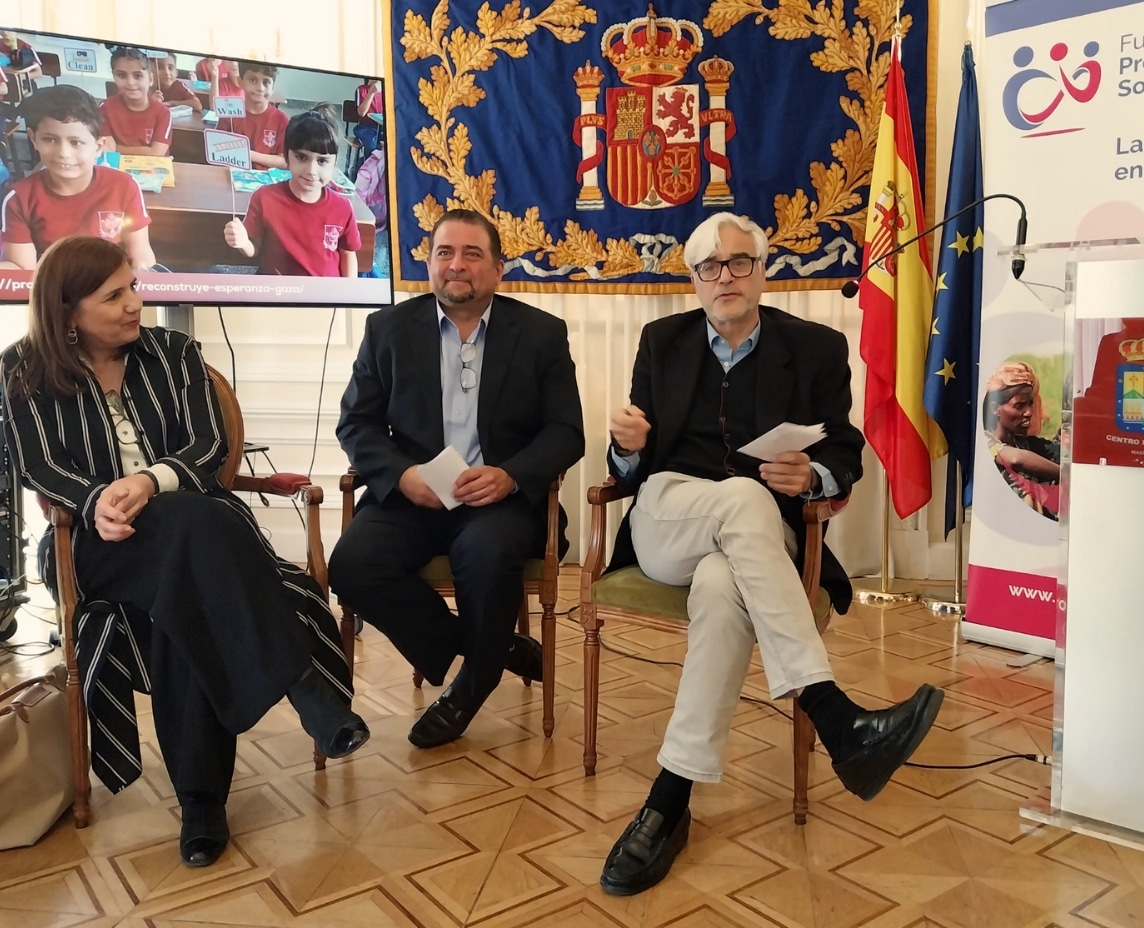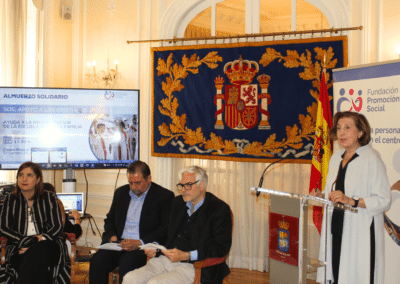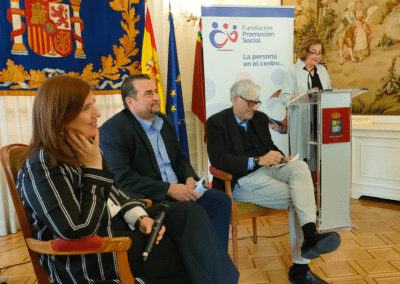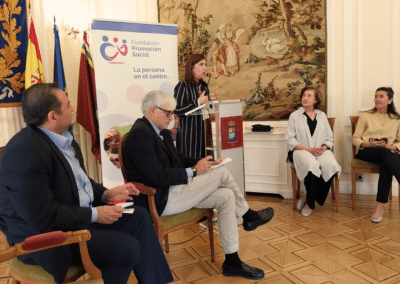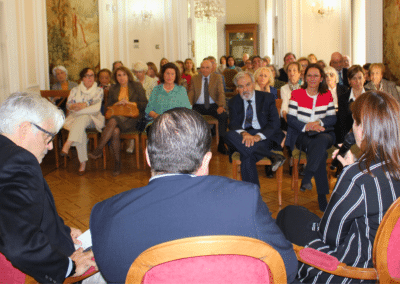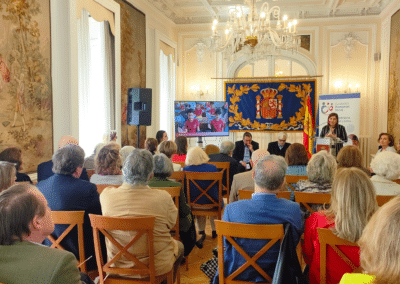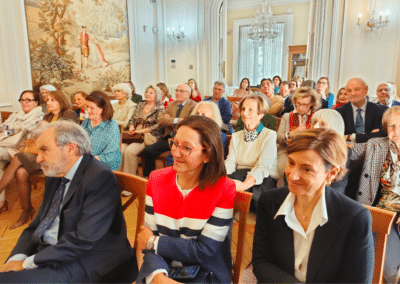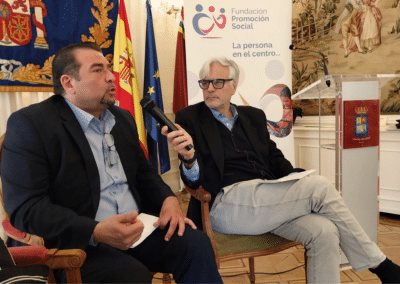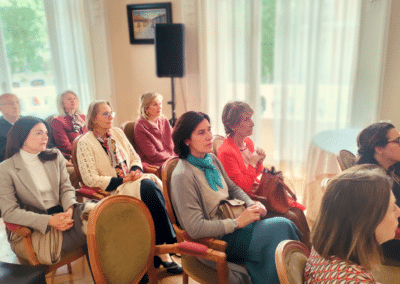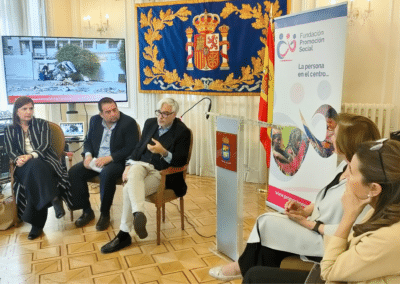This May 22 we celebrated the annual solidarity lunch of the Social Promotion Foundation, a meeting in which many of our partners, collaborators and friends have gathered.
The theme of this lunch has revolved around our campaign ‘SOS: Rebuild Hope in Gaza’, an initiative with which we are working to raise funds for the reconstruction of the Holy Family School in Gaza. This educational center was built by our foundation between 2000 and 2002 and has been severely damaged by the onslaught of
An urgent reconstruction
The solidarity lunch began with a few words of welcome from Jumana Trad, president of the Foundation, in which she recalled and expressed our commitment to the development of the Palestinian Territories, where we have been working since 1994. Among all the projects we have developed in this part of the world, Trad admitted that “one of the most significant and special for us has been the construction of the Holy Family School of the Latin Patriarchate in Gaza”, recalling that “this educational center is intended to accommodate 800 Gazan children regardless of race, nationality or religion”, so its reconstruction is for us “an urgent priority”, to preserve its legacy of inclusion, in addition to its educational excellence.
Then, our Project Director, Macarena Cotelo, the COPE journalist, Fernando de Haro, and our new head of mission in Jerusalem, Yacoub Tahhan, participated in a discussion in which they shared their experience and personal testimony regarding the presence of Christians in the Holy Land.
From the point of view of cooperation and from the point of view of our Foundation, Cotelo pointed out that “all our work is aimed at maintaining the hope of the people”, so that, from the beginning, education has been considered as a fundamental area of work in which we have developed many initiatives to “build the future”.
Cotelo also referred to the Holy Family School we built in Gaza and said that in several past conflicts and in the current war it has served as a refuge, especially for Christian minorities. “Currently it has come to house some 2,500 people,” he explained.
He also recounted that the Latin Patriarch of Jerusalem, Cardinal Pierbattista Pizzaballa, visited the Gaza parish last week and was able to see the hardships with which so many people are surviving the conflict. “We are very much in contact with the Latin Patriarchate to see how events are evolving and to be ready to start the reconstruction of the Holy Family School as soon as possible,” he said in this regard.
“We will continue to work to help people. We want to be there always, that is our purpose,” Cotelo stressed.
The relevance of Christians in the Holy Land
For his part, Fernando de Haro explained that “the Middle East is all about the Holy Land” and shared his experience about the personal interest of his journalistic work on the role of Christian minorities in this region.
At the beginning, his objective was to explain and denounce from a quantitative point of view how the pressure of the different political powers in the area had managed to reduce the number of Christians in the Middle East and to describe the way of life of “these people of light”, as he called them.
However, as he progressed in this journalistic work, de Haro discovered “the qualitative importance of the presence of these Christians”, without caring so much about the number. Thus, he discovered that they are very relevant in two ways. Firstly, to remind Christians all over the world, especially those in the West, that “Christianity is not just a sum of values, but an event that occurred more than 2,000 years ago”. Secondly, he noted the key role that these Christians play in the civil construction of the societies in which they live.
A living testimony
Yacoub Tahhan shared with the audience his personal testimony as a Christian from the Middle East. “We remain in a territory in continuous conflict that we also feel is ours, because it is the land where Jesus Christ lived,” he said.
In this regard, he explained that currently it is estimated that only about 180,000 Christians live in the Holy Land, when, in reality, it is estimated that there should be around one million. “The situation of Christians in the Holy Land has always been complicated, especially since the 19th century, when many became acquainted with the Western way of life and decided to migrate to other countries, as happened again in the wars of 1948 and 1967,” he argued.
“We do not want the Holy Land to be a museum of dead stones, we want to maintain Christian traditions and customs”, said Tahhan when justifying the reason why these Christian minorities decide to remain there. In spite of this, he recognized that “it is becoming more and more difficult for us and we are questioning our permanence”.
With regard to the current war that began in October 2023, he explained that this situation is deeply harming Christians in Gaza, the West Bank and Jerusalem. The first ones, fundamentally, because civil and religious infrastructures, such as schools and churches, are being attacked without distinction. To the second and third, because the restrictions on movement, the closure of borders, or the plummeting of key economic sectors, such as tourism, is making the daily life of citizens increasingly difficult in many ways.
In the same vein, Tahhan regretted that “war always gives prominence to the radicals of the sides, so that people also become radicalized, as is happening right now”. Faced with this sad situation, he recalled that “Christians believe that we must live in peace; radicalism cannot be a way of life”, so “we remain not because of a declaration of struggle, but because it is the Holy Land”.





